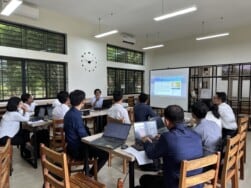Government Partnership to Advance Education for Sustainable Development
December 15th, 2023 | Blogs
Young people in Cambodia conduct field research at a pumpkin farm.
Governments and organizations worldwide are sharing innovations and discussing solutions for equipping teachers and learners with the skills, knowledge, and agency to address climate change and take action for sustainable development. Transforming education for sustainable development (ESD) requires advancing policy; transforming learning environments; building the capacity of educators; empowering and mobilizing youth; and accelerating local-level action.
As a trusted partner and technical assistance provider to the Government of Cambodia for three decades, World Education will accompany the Ministry of Education, Youth, and Sports (Ministry) to represent Cambodia at the UNESCO Education for Sustainable Development 2030 meeting in Tokyo December 18-20, 2023. We will be working alongside the Ministry to develop and advance their Education for Sustainable Development 2030 country initiative and roadmap.
Cambodian experts and entities identify needs and set the agenda and our technical assistance follows their lead. We have participated in co-creation and mutual learning processes with our partners to improve early grade learning outcomes, deliver mine risk and HIV/AIDS education, and enhance digital learning in Cambodia. Similar processes can also advance ESD.

World Education and Ministry of Education, Youth, and Sports staff have collaborated to improve education for over 3 decades.
Country-wide efforts to implement ESD themes and approaches require coordinated efforts to develop, adapt, or scale existing curricula and build the capacity of education officials at all levels to use the materials.
When Cambodia’s Ministry of Education announced a new early grade reading package of teaching, learning, and teacher professional development materials, we supported the early rollout in schools around the country and built the capacity of Ministry staff to continue the expansion. At the central level, we contributed to the ongoing development of the package.
In collaboration with the Ministry’s Primary Education Department, we supported a phonics-based reading curriculum and developed short-interval reading benchmarks, interval assessments, and targeted reading interventions for grade 1-3 students that have been adopted for nationwide use.
Learning institutions need to be aligned with sustainable development principles themselves if they are to develop learners with the attitudes and skills to take transformative action. This requires a “whole school” approach that brings school administration, curricula content, and teaching methodologies in alignment with ESD principles.
To support this shift, we prioritize holistic programming, stakeholder-driven development, and improved educational management. We are currently assisting the Ministry to implement a refined school-based management model in over a thousand schools to roll out the new early grade learning package. We’re also working together to ensure the education system can adapt to future challenges, including developing remedial approaches and leveraging distance learning and remote teacher training.
How students learn is just as important as what they learn. ESD requires experiential and innovative pedagogy, and teachers need continuous professional development that familiarizes them with new pedagogy styles and equips them with the skills to adapt to changes.
Cost-effective methods, including remote teacher training available nationwide, are also vital if the government is to meet its ESD 2030 targets, and teachers and students need the skills to navigate an increasingly digital world. With the Ministry, we established an online platform to train teachers and teacher educators and worked with departments within the Ministry to manage data and pilot two accredited courses. The ministry is now making plans to scale up use of the platform.
In our work improving basic education in Cambodia, we focused on youth from remote and rural areas experiencing poverty or gender inequality to improve their access to quality education that met their needs. This included implementing curricula that teach life skills and enhance young people’s employability.
Age-appropriate, action-oriented pedagogy that leverages youth leadership and peer learning helps equip young people as change-agents who mobilize to take action on the issues they care about.
Young people and their communities are the seat of change for adopting sustainable behaviors and lobbying for transformative action. We’re committed to building up the systems that foster close linkages between schools and communities and engagement between district and provincial education officers and school management committees and communities
We are excited to join the Ministry in Tokyo at UNESCO’s Education for Sustainable Development 2030 meeting and continue working together for transformative education in Cambodia.
World Education fosters enduring partnerships across regions and sectors to advance education outcomes for all. We offer education systems strengthening, program design and implementation, applied research and evaluation, capacity development, and policy development services.